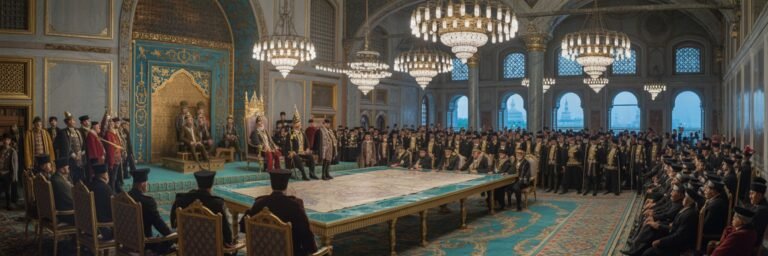INTRODUCTION
From the 13th until the early 20th century, the Ottoman Empire’s influence extended across three continents. Its vast expanse fostered an environment where intellectual thought, poetry, and political ideology thrived, culminating in grand speeches and profound quotes which still echo today. These quotations were reflections of the times, encapsulating the essence of society, politics, and culture during the Empire’s reign. This article will delve into these poignant words, speeches, and their historical contexts. These gems of wisdom, polemic declarations, charismatic orations, and poetry still resonate, standing as testaments to the multifaceted legacy of the Ottoman Empire.
HISTORICAL BACKGROUND
The Ottoman Empire was born out of the ashes of the declining Seljuk Sultanate of Rum. Osman I, the empire’s founder, established a state within Anatolia’s borders in the early 1300s. Over six centuries, this empire expanded enormously, covering present-day Turkey, Greece, parts of Eastern Europe, Middle East, and North Africa.
Through this period, the Ottoman Empire was home to influential figures who made lasting contributions to literature, philosophy, politics, and jurisprudence. Figures like Sultan Mehmed the Conqueror, poet Yunus Emre, and Sufi mystic Rumi, to name only a few, aided in shaping the Empire’s intellectual archive.
THEORIES AND INTERPRETATIONS
The victorious declaration of Mehmed the Conqueror, which followed the fall of Constantinople in 1453, is one heavily studied quote. Mehmed proclaimed, “What a wonderful city we have given over to plunder and destruction.” Theories abound regarding the interpretation of this statement. Many historians view it as a manifestation of Mehmed’s genuine remorse for the destruction the city had to undergo. Others interpret it as a boastful remark, showcasing the Conqueror’s grandeur and power.
A popular quote attributed to another influential figure, Suleiman the Magnificent, reads, “I am Suleiman, in whose name the Friday sermon is read in Makkah and Madina. And it is I who am the Sultan of Sultans in Istanbul.” The quote signified a claim of his authority over the Islamic world. However, some interpret it as a comment symbolizing the duality of the Empire’s identity – simultaneously a European and Muslim empire.
MYSTERIES AND CONTROVERSIES
Interestingly, the certainty over the authenticity and accurate attribution of these quotes to these historical figures is a matter of controversy and debate. For example, many of the statements attributed to Yunus Emre have been questioned due to the lack of written historical records, leaving us to rely heavily on oral traditions and folklore.
This debate extends to quotes from the influential Sufi mystic Rumi. His verses, such as “Come, come, whoever you are, wanderer, worshiper, lover of leaving; ours is not a caravan of despair. Even if you have broken your vows a thousand times, come, yet again, come,” translates into an encompassing philosophy of universal love. Whether these words indeed sprang from Rumi or were products of later interpretations is a point of contention.
SYMBOLISM AND CULTURAL SIGNIFICANCE
These quotes mirror societal values and provide incredible insights into the Ottoman Empire’s diverse cultural mosaic. Mehmed’s quotation signified a melancholic celebration of power, a symbolism reverberating in the cultural ethos of the Empire. Suleiman’s quote is an affirmation of the Ottoman Empire’s perceived custodianship of Islam and identity as a globally influential state.
Rumi’s verses symbolize the spirit of inclusivity and universalism personified in the Empire’s multicultural expanse. Such quotes, whether accurately attributed or not, have served as valuable guiding principles, framing our understanding of the Empire’s cultural significance.
MODERN INVESTIGATIONS
In recent years, multidisciplinary efforts from historians, linguists, and cultural scholars have renewed the study of the Ottoman Empire’s rich oratory tradition. Efforts are underway to decode, authenticate, and popularize these speeches and quotes, further bridging the contemporary world with the medieval Empire.
Digital humanities, archival digitization, and computational linguistic analyses are bringing us closer to understanding the historical realities that these quotes reflect. Such initiatives are vital as they unearth forgotten speeches, validate contested quotes, and enable the accurate translation of these verbal relics.
LEGACY AND CONCLUSION
The influence of these quotes stretches beyond the Ottoman Empire’s geographical and temporal confines. Quotes from Sultan’s speeches and poet’s verses have become popular wisdom, with translations available in multiple languages. Rumi’s poetry, in particular, has found global resonance, with numerous translations and interpretations adorning bookshelves worldwide.
The Ottoman Empire’s narrative, as illustrated through these quotes, remains powerful and telling. These quotes provide a gateway into understanding the layers of empire’s historical legacy and its implications in the present day. Regardless of whether they originated with the attributed individuals or have evolved with time, these famous lines encapsulate the essence of a bygone era. They allow us a peek into the depths of the human soul at that time, capturing the social, political, and spiritual dynamics that once governed the illustrious Ottoman Empire. It serves as proof that words, once spoken or written, become immortal, inspiring and enlightening generation after generation.






